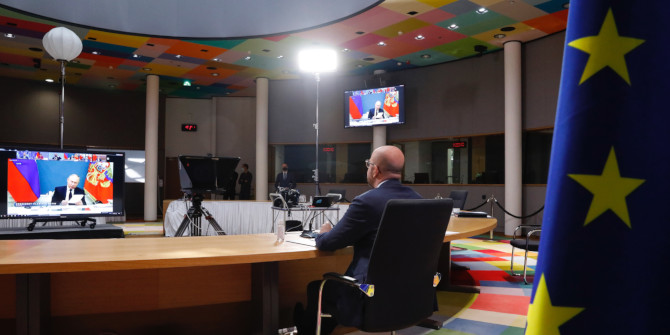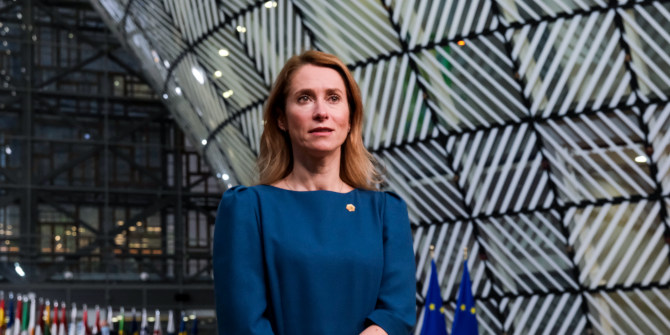The United Nations Development Programme has proposed a “Türkiye Compact” that would see Turkey receive trade facilitation if it agrees to provide better formal employment opportunities for refugees living in the country. Friedrich Püttmann and Kemal Kirişci argue the plan would have key advantages for both Turkey and Europe.
European countries have an interest in supporting refugees abroad and the communities that host them. This is true for two main reasons. The first is they have a commitment to global solidarity and responsibility-sharing in the protection of refugees worldwide, as expressed through their endorsement of the Global Refugee Compact.
With the exception of Hungary, all European countries supported the Compact at the UN General Assembly on 17 December 2018, affirming a collective moral duty to help refugees and their host communities. The Global Refugee Forum in Geneva serves as a platform where this commitment is regularly translated into action through various pledges by governments, the private sector and civil society organisations.
The second reason is there are a considerable number of refugees attempting to reach Europe, with those in Turkey being a prominent example. This has created political conflict both within European countries and between European countries, leading to European governments attempting to prevent refugees from reaching Europe via irregular migration.
Regardless of our personal views on this issue, we are faced with this reality. It is therefore advantageous for European governments to ensure conditions in countries that host refugees enhance the self-reliance of refugees and prevent conflicts from emerging between refugees and host communities. For this to happen, it is vital to consider the interests of host communities and alleviate some of the burden they experience.
Syrian refugees in Turkey
Turkey hosts the largest number of refugees in the world, with over 3.6 million Syrian refugees registered in the country. Encouraging the self-reliance of Syrian refugees is not only in Europe’s interest but could also be in Turkey’s interest given the protracted nature of the situation and the lack of viable solutions.
Mass repatriation is broadly opposed by Syrian refugees and large-scale resettlement remains unrealistic. In contrast, increasing the self-reliance of Syrian refugees would allow them to become taxpayers and contribute to Turkey’s social welfare system and economy. At present, they mostly depend on humanitarian assistance financed by Turkey, the EU and others. This aid has become a source of public resentment in Turkey.
Constructive and well-balanced migration agreements can be an effective way to implement such measures. They also help ensure that European publics are not tempted to abandon the Geneva Convention of 1951, particularly in light of the current rise in far-right populism across the continent. However, Europe’s aid to refugees abroad, for example to Syrians and host communities in Turkey under the EU-Turkey Statement of 18 March 2016, and beyond, has become increasingly unsustainable due to the protracted situation faced by Turkey’s Syrian refugees.
This is because the measures that were designed at the height of the refugee crisis are predominantly centred around short-term humanitarian assistance, primarily targeting the refugees themselves. It is now time to move to a more long-term developmental approach, as widely discussed among migration experts. This approach should acknowledge the enduring nature of the situation and provide mutual benefits to both Syrian refugees and Turkish citizens, as many have already demanded.
The “Türkiye Compact”
To achieve this, new policy ideas that promise to be more sustainable and effective are urgently needed. An example of such an idea is a proposal by the United Nations Development Programme (UNDP) for a “Türkiye Compact”. Its central proposition is for Turkey to facilitate Syrian refugees’ access to formal employment and, in return, for western countries, such as the EU, the US and Canada, to extend trade facilitation to Turkey. Such facilitation would give Turkish companies operating in the agricultural, processed foods and textile sectors – sectors where many Syrian refugees in Turkey currently work informally – easier market access.
According to a feasibility study, this approach would boost Turkish exports by an estimated $7.8 billion in 2025, create almost 284,000 jobs, of which 20% would go to Syrian refugees, and add 0.82% of value to Turkey’s overall GDP. Like the EU-Jordan Compact, which it is modelled on, the Türkiye Compact would condition trade liberalisation by western countries on the increased formal employment of Syrian refugees in Turkish companies.
Many current humanitarian measures for Syrian refugees in Turkey aim to increase their employability through training and short-term cash-for-work programmes. However, as important as these efforts are to improve their employment prospects, these measures alone do not create the actual jobs that in times of economic crisis are urgently needed for both Syrian refugees and their Turkish host communities.
Moreover, the Türkiye Compact would help foster social cohesion between Turkish citizens and Syrian refugees. It would facilitate positive social contact between the two communities by minimising the likelihood of Syrian refugees being exploited in the informal labour market, reducing competition over informal jobs with Turkish citizens and fostering a scenario where Turkish citizens and Syrian refugees work side by side.
By promoting the economic inclusion and self-reliance of Syrian refugees, following the approach of other countries with large refugee populations such as Colombia and Uganda, the Türkiye Compact could enable refugees to become more independent and productive members of Turkish society. This, in turn, could alleviate the rising social tensions around them.
Political feasibility
There is a clear need to make European and US support to Syrian refugees and their host communities in Turkey more effective and sustainable. This is especially important given the protracted situation that Syrian refugees in Turkey find themselves in and the dramatically rising resentment against them.
Moreover, if successful, these initiatives could lay the foundations for a template to reform the commitment of the Global North to solidarity with refugees and their host communities worldwide. This would help address demands coming from the countries of the Global South, in particular, where according to the United Nations High Commissioner for Refugees more than 75% of the world’s refugees are hosted.
While the UNDP has assessed the economic feasibility of the Türkiye Compact, its political feasibility remains unclear. The question that now needs to be asked is what will it take for European countries, such as the EU’s member states, the UK and Switzerland, to endorse this compact?
Together with Yaprak Gürsoy, Chair of Contemporary Turkish Studies at the LSE’s European Institute, the authors are currently conducting a one-year research project on the political feasibility of the Türkiye Compact
Note: This article gives the views of the authors, not the position of EUROPP – European Politics and Policy or the London School of Economics. Featured image credit: Mrtkpn / Shutterstock.com





